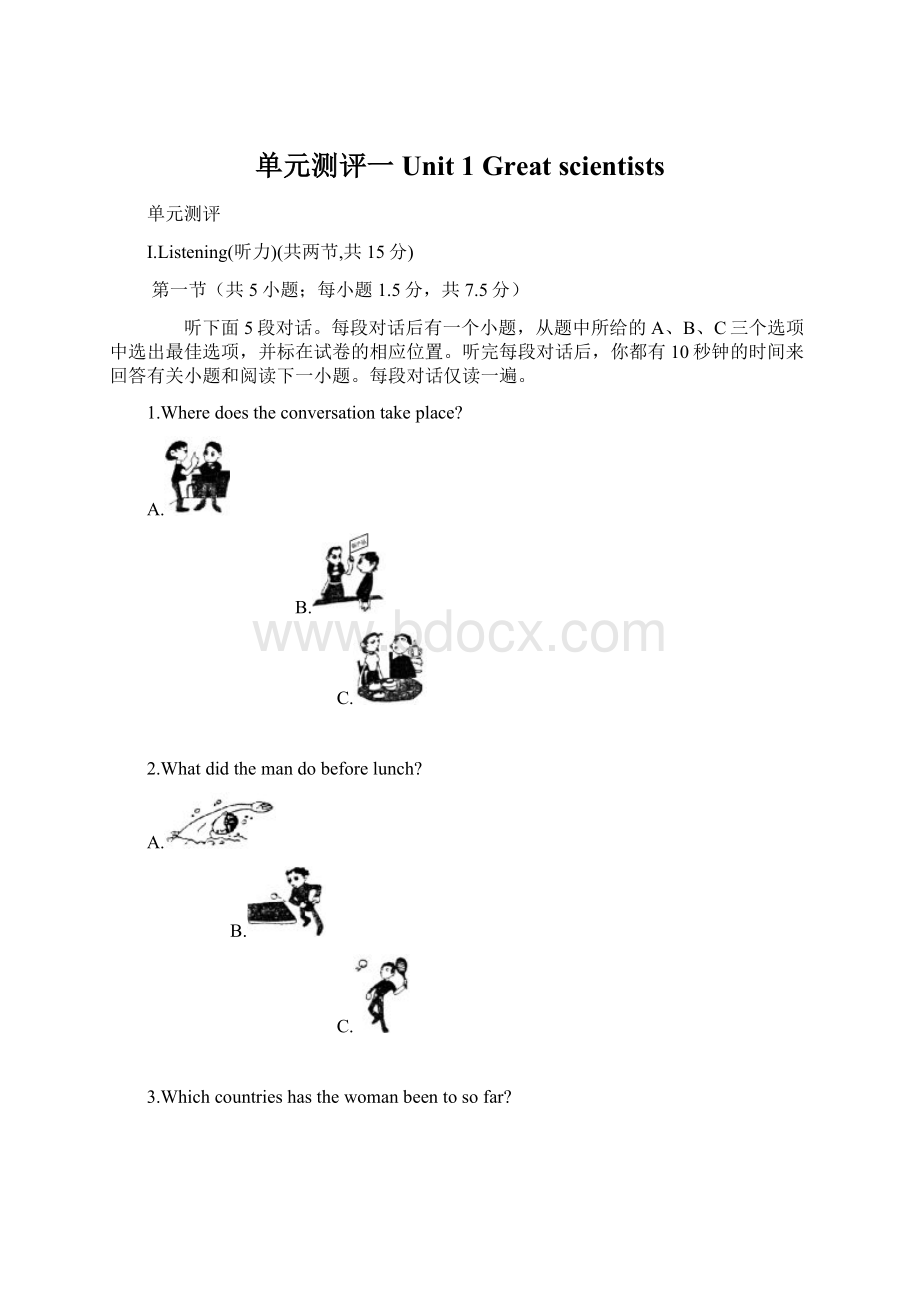单元测评一Unit 1 Great scientists.docx
《单元测评一Unit 1 Great scientists.docx》由会员分享,可在线阅读,更多相关《单元测评一Unit 1 Great scientists.docx(18页珍藏版)》请在冰豆网上搜索。

单元测评一Unit1Greatscientists
单元测评
Ⅰ.Listening(听力)(共两节,共15分)
第一节(共5小题;每小题1.5分,共7.5分)
听下面5段对话。
每段对话后有一个小题,从题中所给的A、B、C三个选项中选出最佳选项,并标在试卷的相应位置。
听完每段对话后,你都有10秒钟的时间来回答有关小题和阅读下一小题。
每段对话仅读一遍。
1.Wheredoestheconversationtakeplace?
A.
B.
C.
2.Whatdidthemandobeforelunch?
A.
B.
C.
3.Whichcountrieshasthewomanbeentosofar?
A.
B.
C.
4.WhatisDavidgoingtodo?
A.
B.
C.
5.Whatistheman?
A.
B.
C.
听力原文及答案:
(Text1)
M:
I’mterriblysorry,butI’vedroppedaplate.
W:
That’sallright.
M:
I’llbuyyouanewonetomorrow.
W:
No,pleasedon’t.Icouldn’tletyoudothat.
(Text2)
W:
Hello,howdidyouspendyouronedayholiday?
M:
IplayedtennistilllunchtimeandwentforaswimwithJohn.
(Text3)
M:
HaveyoueverbeentoCanada?
W:
Iwishtosomeday.SofarI’vebeentoJapan,SouthKoreaandChina.
M:
Canadaisworthvisiting.
(Text4)
W:
David,areyoucomingwithustothepark?
M:
No,Imsorry,butIhavetodomyhomework.
(Text5)
W:
Hi,Paul.Didyouhaveagooddayatwork?
M:
No,Ihadaterribleday.
W:
Whathappened?
M:
Imadealotoftypingmistakes,andthenIforgottosendthelettermybossaskedmetosend,sohewasveryangry.
1~5CCABB
第二节(共5小题;每小题1.5分,共7.5分)
听下面2段对话或独白。
每段对话或独白后有几个小题,从题中所给的A、B、C三个选项中选出最佳选项,并标在试卷的相应位置上。
听每段对话或独白前,你将有时间阅读各个小题,每小题5秒钟;听完后,各小题将给出5秒钟的作答时间。
每段对话或独白读两遍。
听第6段材料,回答第6~7题。
6.Wheredidthewomanliveallherchildhood?
A.InSydney.
B.InLondon.
C.InFrance.
7.Wheredidthewomanmarryherhusband?
A.InBritain.
B.Inherhometown.
C.InFrance.
听第7段材料,回答第8~10题。
8.HowolddoyouthinkASIMOwaswhenhegothiredinthemuseum?
A.Twoandahalfyearsold.
B.Morethanthreeyearsold.
C.Oneyearold.
9.WhyisASIMOhiredinthemuseum?
A.Towelcomevisitorsinafriendlyway.
B.Tointerpretforvisitorsin50differentlanguages.
C.Tohelpexplainscientificachievementsmoreeasily.
10.WhatdoweknowaboutASIMOfromthepassage?
A.ASIMOwashiredasaninterpreterbythemuseum.
B.Hewasabletoclimbstairsandchangedirectionswhenfirstmade.
C.Heisabletowalkonitstwolegsmuchfasterthanahumanbeing.
听力原文及答案:
(Text6)
M:
Wherewereyouborn?
W:
IwasborninSydney.
M:
Isthatwhereyoulivedallyourchildhood?
W:
Yes,Ilivedthereallmychildhood.
M:
Mmm,howlonghaveyoubeeninBritain?
W:
Oh,I’vebeenheresince1972.
M:
Whydidyoucomehere?
W:
ImarriedanEnglishman!
Itwasquitearomanticsituation.WewerebothinFrance,andwemetandmarriedthere.
(Text7)
Thereisarobot,namedASIMO,inaTokyomuseum.Hecanwalkontwolegsjustlikeaperson.Histopspeedis1.6kilometersperhour.Whenhewasfirstcreatedin2000,stairswereverydifficultforhimandhehadtoknowtheirexactmeasurementsbeforehand.Nowhehasbeenimprovedsothathecanclimbstairswithease.Healsohasnotroublechangingdirectionsandcanevendance!
ASIMOcantalkandunderstandabout50differentvoicecommands.
Atthesciencemuseum,openedinJuly2001forpeopletocomeintocontactwiththelatestscientificachievement,“interpreters”explainandguidevisitorsthroughthedisplays.ASIMOwasfirsthiredonJanuary13,2004tobeoneoftheinterpretersfortherobotdisplay,explainingthefruitsofscientificresearchinaneasytounderstandmanner.
6~10ACBCA
Ⅱ.MultipleChoice(单项填空)(共15小题;每小题1分,共15分)
1.Whoforthelossofthatcar?
A.isblamedB.shouldblame
C.istobeblamed D.istoblame
答案:
D toblame表示“应受谴责的;有过错的”。
2.Pricesofdailygoodsthroughacomputercanbelowerthanstoreprices.
A.areboughtB.bought C.beenboughtD.buying
答案:
B 分析语境逻辑可知,该空表“通过电脑购买”,goods与buy之间是被动关系。
所以应用过去分词短语boughtthroughacomputer作后置定语。
3.Tom,intheplay,neverwantedtogotosleep.
A.interesting;interestedB.interested;interesting
C.interested;interestedD.interesting;interesting
答案:
B 第一空应填interested,来源于系表结构beinterestedin;第二空表“令人感兴趣的”,应填现在分词interesting。
4.Theteachersrequestthestudentsremainwhentheyareinclass.
A.seatB.seating C.seatedD.tobeseating
答案:
C remainseated为系表结构,不具有被动色彩。
5.—DoyoremembertogiveMarythemoneyowedtoher?
—Yes,IwilldoitImeet.
A.whileB.immediately C.suddenlyD.once
答案:
B 此处缺少连词排除C项,while表对比,引导时间状语从句时从句谓语动词应为延续性动词,once引导条件状语从句,故选B。
6.Hisearsarehighlysensitiveanyunusualsoundinthemachine.
A.toB.for C.withD.at
答案:
A besensitivetosth.意为“对……很敏感”。
7.Soterriblethepilotcouldn’tflythroughit.
A.wastheweatherthatB.theweatherwasthat
C.wastheweatherasD.theweatherwasas
答案:
A so在句首,句子用部分倒装,该句用了so...that句型。
8.Thefacthefailedintheexamisnottheonehetoldme.
A.which;thatB.that;/ C.which;whichD./;that
答案:
B 本题考查同位语从句与定语从句的区别。
题意为“他考试不及格这一事实并不是他告诉我的那么回事”。
很明显,hefailedintheexam是作fact的同位语,不是定语,要用that引导且不能省略;hetoldme是定语从句修饰one,引导词可用that,也可省略。
9.theinjurestohisfaceandhands,hebrokehisleftleg.
A.BesideB.Despite C.ApartfromD.Becauseof
答案:
C apartfrom意为“除了”,另外也可用besides。
10.Withalltheeffortsofourcountry,SARShas.
A.defeatedB.beendefeated C.wonD.beenwon
答案:
B defeat指“打败对手”,用被动语态。
而win指“赢得”,宾语通常是比赛、竞赛之类的名词。
11.canyouexpecttogetapayrise.
A.WithhardworkB.Althoughworkhard
C.OnlywithhardworkD.Nowthatheworkshard
答案:
C 因句子用了倒装结构,所以只有C项符合要求,B项不成立,A、D两项用于句首时,主句不用倒装。
12.Insuchdryweather,theflowerswillhavetobewateredifthey.
A.havesurvivedB.aretosurvive
C.wouldsurviveD.willsurvive
答案:
B 在条件状语从句中,不用一般将来时,须用一般时代替;在“be+动词不定式”结构中,be是系动词,todo作表语,故aretosurvive应是一般现在时,本结构在此句中表示假设。
题意:
在如此干燥的天气里,如果要让花儿存活,就必须给它们浇水。
13.Mary’spalefacesuggestedthatsheillandherparentssuggestedsheadoctor.
A.shouldbe;shouldseeB.was;see
C.be;seeingD.was;wouldbe
答案:
B 第一个suggest表示“表明;暗示”,后接宾语从句时不用虚拟语气;第二个suggest表达“建议”,后面的宾语从句用虚拟语气。
14.Theybelievedinman’sabilityytheworld.
A.changeB.tochange C.changingD.changed
答案:
B 不定式作后置定语,修饰ability。
15.Thegovernmentwantstofarmpricesattheirpresentlevel.
A.stayedupB.bringup C.takeupD.keepup
答案:
.D stayup意为“熬夜”;bringup意为“养育,教养”;takeup意为“开始学习”;keepup意为“居高不下,不低落,继续,保持”。
Ⅲ.Cloze(完形填空)(共20小题;每小题1.5分,共30分)
Therehavebeenmanygreatinventions,whichhavechangedthewaywelive.Thefirstgreatinventionwas 1 thatisstillveryimportanttoday-thewheel(轮子).Thismadeiteasierto 2 heavythingsandtotravellongdistances.
Forhundredsofyearsafterthattherewerefewinventionsthathaveasmuch 3 asthewheel.Thenintheearly1800’stheworldstartedto 4 .Therewaslittleunknownlandintheworld.Peopledidnot 5 toexploreanymore.Theybegantoworksoasto 6 lifebetter.
Inthesecondhalfofthe19thcenturymanygreatinventionsweremade. 7 themwerethecamera,theelectriclightandtheradio.Theseallbecameabig 8 ofourlifetoday.
Thefirstpartofthe20thcenturysawmoregreat 9 :
thehelicopterin1909;movieswithsoundin1926;thecomputerin1928;andjetplanesin1930.Thiswasalsoatime 10 anewmaterialwasfirstmade.Nyloncame 11 in1935.Itchangedthe 12 ofclothespeoplehadbeenwearing.
Themiddlepartofthe20thcenturybroughtnewwaystohelppeoplegetover 13 .Theyworkedverywell.Theymadepeoplehealthierandletthemlive 14 lives.Bythe1960’smostpeoplecould 15 toliveatleast60.
Bythistimemostpeoplehadaverygoodlife.Ofcoursenewinventions 16 tobemade.Butmannowhadadesiretoexploreagain.Theworldwas 17 tomanbutthestarswerenot.Manbeganlookingforwaystogointo 18 .Russiamadethefirststep.ThentheUnitedStatestookastep.Sincethenothercountries 19 ChinaandJapan,havemadetheirstepsintospace.
In1969mantookhisbiggeststepawayfromtheearth.Americansfirstwalkedonthemoon.Thisiscertainlyjusta 20 thought.Newinventionswillsomedayallowustodothingswehaveneverdreamedof.
1.A.theoneB.thatC.oneD.it
2.A.carryB.bringC.findD.put
3.A.timeB.knowledgeC.situationD.effect
4.A.appearB.mindC.changeD.rise
5.A.haveB.wantC.decideD.like
6.A.workB.turnC.makeD.think
7.A.InB.AmongC.BetweenD.About
8.A.sortB.partC.stepD.use
9.A.resultsB.jobsC.thingsD.inventions
10.A.whenB.whichC.ifD.as
11.A.outB.inC.awayD.about
12.A.restB.courseC.kindD.pattern
13.A.rulesB.diseasesC.difficultiesD.problems
14.A.moreimportantB.longer
C.happierD.better
15.A.hopeB.expectC.startD.ask
16.A.goonB.beginC.areableD.continue
17.A.usefulB.popularC.commonD.known
18.A.spaceB.skyC.airD.room
19.A.includingB.exceptC.butD.like
20.A.movingB.interestingC.beginningD.surprising
答案:
1.C 此处用one代替上文提及的invention以避免重复。
2.A 此题根据句意判断,便于人们携带东西应选carry,bring是“带来”,find是“发现”,put“放”,均不符合句意。
3.D 此题是典型的as...as...结构,根据题意没有哪些发明有轮子的发明那么大效用。
其他几项均不合题意。
4.C 世界开始发生变化了,而不是出现(appear),介意(mind)或上升(rise)。
5.A 因为世界上未知地方已几乎没有,所以人们不必要再探索了,强调没必要而不是不想、不喜欢或决定不。
6.C makelifebetter为习惯搭配,意为“使生活更美好”。
7.B 三者以上的之间,应选among,要表达“两者之间”要用between。
in与about是错误搭配,不符合题意。
8.B 根据题意,今天这一切已成为我们生活的一部分,选part。
其他几项意思错误。
9.D 根据上下文可知,本文主要讲更多的发明创造,应使用比较级more,从而与上文形成对比,因此排除其他选项。
10.A 此处应是定语从句,先行词atime表时间,因此选when。
11.A 根据意思可知选A。
comeout意为“出现”;comein指“进来”;comeaway意为“脱落,脱开”;comeabout指“发生,转向”。
12.C 此题意为改变人们的衣服种类,而不是图案pattern,更不是rest或course。
13.B 此题可根据下文内容进行选择。
下文讲人的健康,显然只有diseases与寿命有关。
14.B 人们身体更健康,自然寿命就长,应选longer。
但身体健康并不一定生活就好(better),生活好坏包括很多因素,happier同理。
15.B 根据句意,大多数人们期望至少能活到60岁。
expect经常和can(could)搭配使用,而hope